
Guest blogged by Moninder Singh
I am for Palestinian statehood, and at the same time I am for the existence of the state of Israel. I am against rockets fired into civilian areas killing innocents indiscriminately, but I am even more against what can only be seen as purposely targeted air strikes against the children and innocents of Gaza. I am against those who think the existence of Jews and Israel must be challenged, and in the same breath, I am against Zionist and Israeli nationalism that doesn’t recognize the state of Palestine or the right to self-determination of the Palestinian people. It is indeed that simple in my mind.
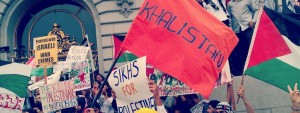
A recent Palestine solidarity rally in the Bay area. Photo by Gurinder Singh Wadhwa.
It was only a recent photograph of a forward thinking and young Sikh waving a Khalistan flag at a pro-Palestine rally in California  that pushed me to give my views on the topic as well– but as a Sikh and not a wannabe political analyst. For weeks I have been listening to conversations from many within the Sikh community on the issue of Palestinian statehood versus the existence of Israel. The underlying question nobody is really touching on is, why does it have to be one or the other?
This illegal occupation and massacre instigated and carried out by Israel with excuses of Palestinian aggression has nothing to do with the fact that Yasser Arafat (former Leader of the Palestine Liberation Organization) was close to Indira Gandhi or the fact that Israel was instrumental in training Indian law enforcement agencies on dealing with threats to their national security which were also deployed in Punjab against Sikhs throughout the 1990s. These actions do not define the masses or their rights. It defines only misguided leadership and corrupt governments. What is even more troubling is the refusal of many Sikhs to comment on this issue by stating, “I am not an expert in Palestinian/Israeli affairs.” But who said you had to be? If it is only the “experts†that are needed to make decisions on the fate of an entire population, then we as Sikhs should take up shovels for digging graves and hauling carts of wood for funeral pyres because the oppressed peoples of the world who are resisting tyranny like the Palestinians will need them today, and make no mistake that we ourselves will likely need them tomorrow…just like we did yesterday.
A revolution never did and never will need “experts.†A revolution needs nothing but the people. And from them it demands their minds for the ability to think without fear, it demands their voices for the ability to speak without fear, and if needed, it will demand their blood to accomplish their dream to live without fear. It should never be that the oppressed of yesterday becomes the oppressor of today, but when that does happen and as it has happened in the case of Israel oppressing our Palestinian brothers and sisters, we as Sikhs have a duty to uphold the principles of our Gurus and stand in solidarity with and struggle alongside those who are being oppressed.
(more…)
This March marked ten years since the United States invaded Iraq in the name of Iraqi freedom. Ten years later, potentially over one million Iraqi civilian deaths later, where are we now? What are the people of Iraq left with? Aside from extreme instability and near genocide, Iraqis are now dealing with a legacy of cancer and birth defects as a result of our country’s military aggression. A few weeks back on Democracy Now, journalist Dahr Jamail discussed this harrowing reality. He stated:
“[The birth defects] are extremely hard to bear witness to, but it’s something that we all need to pay attention to … What this has generated is from 2004 up to this day, we are seeing a rate of congenital malformations in the city of Fallujah that has surpassed even that in the wake of the Japanese cities of Hiroshima and Nagasaki that nuclear bombs were dropped on at the end of World War II.”
What follows is the clip from the news program. Note that the images in the clip are horrific. This is reality. This is our tax dollars at work.
Occupation has come to carry a different connotation of late as the #OccupyWallStreet movement quickly spreads throughout the country. But for millions in Afghanistan it still means U.S. militarism. It still means war. It still means injustice. Today marks the 10th anniversary of the U.S. invasion of Afghanistan, originally deemed “Operation Enduring Freedom” by then president George W Bush.
Based on my mother’s last name, I know I have roots in Afghanistan, as do many of us Sikhs. Hundreds of thousands of our Afghan sisters and brothers have lost their lives in this war, which has escalated under the Obama Administration. Rather than making my arguments for a complete and immediate withdrawal of U.S. forces from the country, I am instead posting this message from human rights activist and former Afghan MP Malalai Joya on the 10th anniversary of this seemingly endless war.

Guest blogged by Eren Londonwala
Each day I walk down Ferry Lanein Tottenham to my workplace. On Friday 5 August a police cordon blocked my usual route. I learned later that police had shot dead 29 year-old alleged gang-member Mark Duggan the night before. The precise facts remain unclear but early reports suggesting an exchange of fire between police and the dead man have been undermined – Duggan’s gun wasn’t discharged. This was a tragedy I thought and perhaps another instance of excessive force by police in a poor London borough with a large black population. Few anticipated what was to come.
route. I learned later that police had shot dead 29 year-old alleged gang-member Mark Duggan the night before. The precise facts remain unclear but early reports suggesting an exchange of fire between police and the dead man have been undermined – Duggan’s gun wasn’t discharged. This was a tragedy I thought and perhaps another instance of excessive force by police in a poor London borough with a large black population. Few anticipated what was to come.
On the next day members of Duggan’s family – who by then had still not been contacted by police – and other locals went to Tottenham Police Station for answers and to stage a peaceful vigil. Senior police ignored the group and around this time a young female, remonstrating, was apparently “set upon by police with their batons”. Unlike a previous contributor to this blog, who described this incident as “relatively minor”, given the understandably heightened passions live then in Tottenham, I feel the police action was heavy-handed and incendiary. I invite readers to view the evidence and make up their own minds. It was after these events that Tottenham, and in subsequent days other areas in London and England, erupted into the worst civil unrest for a generation.
Then, the causes were unmistakeable – racist policing of ethnic minority communities and social deprivation. So, like some others, I viewed the outbreak of recent violence as a reaction to the continuation of unresolved problems, sparked by the suspicious killing of Duggan – an understandable, and even legitimate, rebellion in other words. The fact that police cars were among the first targets of the Molotov bombs seemed to confirm this. Yet, as the days unfolded, and disorder spread throughout the capital and country, a distinction between the two eras became apparent: 2011 was marked, to a far greater degree than 1981, by opportunist looting which came to devastate as many small independent businesses as insured corporate chains and, amid the chaos, most tragically, led to further loss of life with Duggan’s death being all but forgotten.
We have many songs that remind us of Shaheeds; we acknowledge them in our Ardas; and they are an integral part of our Sikh history. It is a powerful experience to hear how an integral concept in Sikhi manifests in other communities. Specifically the Muslim community, which also adheres to a concept of Shaheedi.
Often times in the media, the concept of Shaheedi has been presented as a form of “brainwashing” done by religious and political leaders to condone terrorism and violence for their own self-interests. However, a recent NPR report highlights how two devote Muslim men from America became Shaheeds out of their own strong will to bring justice back to their home country of Libya.
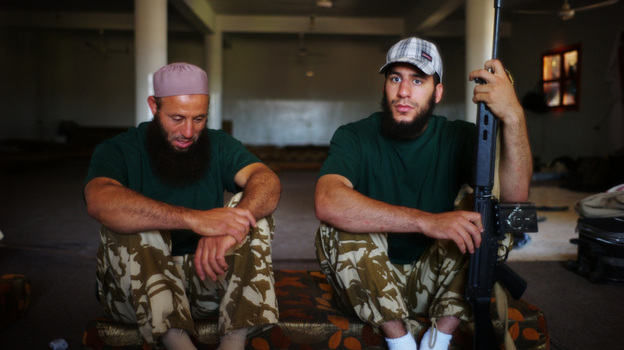
Mabruk Eshnuk (left) and his son Malik (right) left their home in Pittsburgh to volunteer and fight with rebels in western Libya's Nafusa Mountains.
A father and son left their home in Pittsburgh, Pennsylvania (USA) to participate in the Libyan revolution. Mabruk Eshnuk and his 21-year old middle son, Malik Eshnuk, died fighting the forces loyal to Moammar Gadhafi in western Libya.
Mabruk, a devoute Muslim had immigrated from Libya as a teenager. He taught Islam to convicts in the Pennsylvania state penitentiary system. In 2006, he housed the family of a young Iraqi boy who was getting lifesaving treatment in the United States. He said, “Everything that we do and work and help, it’s based on the Quran.” Outraged over what was happening in Libya, he took his middle son to fight in the Western mountains of Libya.
Along with the start of the holy month of Ramadan, the last few weeks have seen an increase in momentum for laws that ban the wearing of the burqa and niqab in European 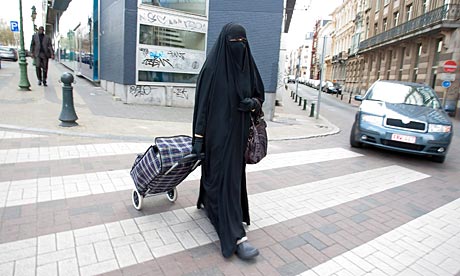 countries. We’ve talked about France before, where the implementation of its law banning Muslim face covering began this past spring. Now Belgium, which passed a similar measure last year, has begun implementing its ban on burqas as of July 23rd, and in Italy, new anti-burqa legislation was just passed by a parliamentary commission this week.
countries. We’ve talked about France before, where the implementation of its law banning Muslim face covering began this past spring. Now Belgium, which passed a similar measure last year, has begun implementing its ban on burqas as of July 23rd, and in Italy, new anti-burqa legislation was just passed by a parliamentary commission this week.
In both countries, like France, a miniscule number of women actually wear the burqa or niqab, begging the question of why an increasing number of European nations feel so threatened by it.
In Belgium, the lawmaker who proposed the bill, Daniel Bacquelaine, “said it was necessary to forbid the wearing of clothes that ‘totally mask and enclose’ the wearer. He described wearing the burqa as ‘not compatible with an open, liberal, tolerant society.’ Peter DeDecker of the Flemish separatist NVA saw the ban as a way of defending ‘our fundamental principles of the enlightenment.'”
Just as in France, what I would argue (and have previously argued) is an attack on religious freedom is being justified with the rhetoric of freedom and liberty (and public safety).
This Monday, Sikhs for Justice is organizing a rally at the United Nations Headquarters to call for UN intervention stop India’s planned execution of Professor Devenderpal Singh Bhullar. Professor Bhullar’s brother, Tejinder Singh Bhullar will be addressing the rally. In their appeal to Secretary General Ban Ki moon, Sikhs for Justice is calling upon the U.N. to intervene and free Professor Bhullar based on a UN General Assembly resolution adopted in 2008 known as Resolution 62/149 which called on all major states to abolish the death penalty. 62/149 is a nonbinding instrument to mark progress on the United Nation’s position that they death penalty undermines human dignity and acknowledges the serious claim that any failure of justice in the implementation of the death penalty is irreversible and irreplaceable.
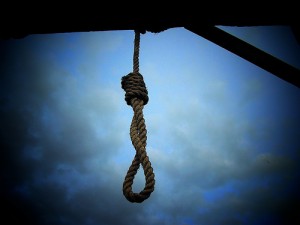 The death penalty too, runs contrary to Sikh historical positions on capital punishment. The Sarkar-e-Khalsa of Maharaja Ranjit Singh Ji, followed a no death penalty policy, as M. Gregor in his 1846 ‘History of the Sikhs’ writes. He notes that, ‘[Ranjit Singh] was the exception of Oriental monarchs, and never wantonly inflicted capital punishment and mutilation.’ Other authors describe, that ‘Humanity indeed, or rather a tenderness for life, was a trait in the character of Ranjit Singh. There is no instances of him having wantonly imbued his hands in blood.’ These sentiments that can be seen as consistent Sikh political philosophy captured by the Zafarnama and other documents. Specifically in the Zafarnama, Guru Gobind Singh Ji quotes the Persian poet Firdausi, writing, ‘How nicely the sweet tongued poet Firdausi has said, to act in haste is the work of the devil,’ referring to Aurungzeb’s executions of the youngest Sahibzadas Zorawar and Fateh Singh and Mata Gujri in Sirhind as the act of ‘Sheitan.’
The death penalty too, runs contrary to Sikh historical positions on capital punishment. The Sarkar-e-Khalsa of Maharaja Ranjit Singh Ji, followed a no death penalty policy, as M. Gregor in his 1846 ‘History of the Sikhs’ writes. He notes that, ‘[Ranjit Singh] was the exception of Oriental monarchs, and never wantonly inflicted capital punishment and mutilation.’ Other authors describe, that ‘Humanity indeed, or rather a tenderness for life, was a trait in the character of Ranjit Singh. There is no instances of him having wantonly imbued his hands in blood.’ These sentiments that can be seen as consistent Sikh political philosophy captured by the Zafarnama and other documents. Specifically in the Zafarnama, Guru Gobind Singh Ji quotes the Persian poet Firdausi, writing, ‘How nicely the sweet tongued poet Firdausi has said, to act in haste is the work of the devil,’ referring to Aurungzeb’s executions of the youngest Sahibzadas Zorawar and Fateh Singh and Mata Gujri in Sirhind as the act of ‘Sheitan.’
Last week marked the 63rd anniversary of the Nakba, meaning catastrophe, when a n estimated 700,000 Palestinians were displaced from their homes with the establishment of the state of Israel in 1948. I, and others, have argued elsewhere why the Palestinian struggle for freedom and self-determination is relevant for us as Sikhs, so I won’t reiterate that here (see Sikh Solidarity with Palestine statement).
n estimated 700,000 Palestinians were displaced from their homes with the establishment of the state of Israel in 1948. I, and others, have argued elsewhere why the Palestinian struggle for freedom and self-determination is relevant for us as Sikhs, so I won’t reiterate that here (see Sikh Solidarity with Palestine statement).
Every year Palestinians and their supporters commemorate the Nakba by holding demonstrations, vigils, and educational events. This year saw unprecedented resistance by Palestinians in the Middle East, who mobilized at numerous points across Israel’s borders. Their resistance to occupation and their commemoration of one catastrophe was met with with violent repression by Israeli forces — catastrophe upon catastrophe. 14 Palestinians were killed and hundreds more injured as Israeli troops fired on the massive protests.
In an interview on Democracy Now last week, Fadi Quran, one of the protest organizers stated:
…we, as a youth movement, called for the protest because, as many of you know, there are about seven million Palestinian refugees who just want to go home, and they’ve been unable to go home for the last 63 years. So at the protest, initially what you had is a lot of people who are my generation, 23 years old, carrying or wheeling their grandparents to the border so that they can finally take them back and they can return to a normal life, where they are free, where they live justly, and where they can pursue happiness.
It’s been over a week now. I’ve been wanting to write, but have been on the road, my head spinning with newspa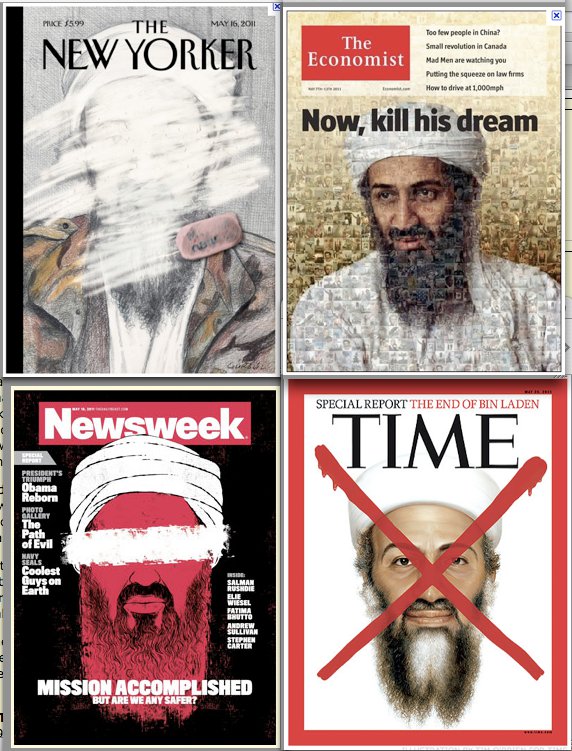 per headlines and the voices of cable news pundits. Navdeep posted some thoughtful reflections and questions here, and in the meantime, we’ve had the opportunity to see the response to bin Laden’s death throughout the country and world. By now, we are all probably well aware of the spontaneous celebrations of thousands at Ground Zero and Time Square in New York City and at the White House, with victorious chants of “USA! USA!”, the night President Obama made the announcement of bin Laden’s death.
per headlines and the voices of cable news pundits. Navdeep posted some thoughtful reflections and questions here, and in the meantime, we’ve had the opportunity to see the response to bin Laden’s death throughout the country and world. By now, we are all probably well aware of the spontaneous celebrations of thousands at Ground Zero and Time Square in New York City and at the White House, with victorious chants of “USA! USA!”, the night President Obama made the announcement of bin Laden’s death.
I was traveling in New Orleans when the news hit, and the mood there was similar. God Bless Americas were being yelled in bars of the touristy French Quarter, people running down the streets (drunkly) yelling “We killed him! We killed him!” with a disturbingly rage-filled glee.
I happened to be exploring the city on my own that night, and was immediately nervous when I heard the news. Within a few minutes, several strangers made snide and/or aggressive comments about bin Laden’s death directly to me, as if to imply that I was related to him. Throughout my week of time in New Orleans and Texas thereafter, strangers heckled me with taunts of “Osama” almost every day. One day, a young kid leaving school (maybe 10 years old) asked me, seemingly earnestly, if I was a terrorist. And I was even pulled out of a night club in Houston by security because I was carrying a bag (which had an instrument in it).
Indeed, the death of bin Laden does not appear to mean the death of bigotry. Colorlines reports:
A mosque in Maine was vandalized with the messages “Osama today, Islam tomorrow” and “Go Home.” In Houston, a schoolteacher was disciplined for racially profiling a Muslim ninth-grader by asking if she was grieving her uncle’s death on Monday. Also this week, Mohamed Kotbi, an Arab waiter who is suing his employer, the Waldorf-Astoria hotel, for religious and racial discrimination following the 9/11 attacks, has reported more taunts from co-workers following bin Laden’s death.
I am curious if other Sikhs have experienced a similar rise in harassment. What does it mean that when the US claims victory over Enemy #1, the general public vilifies Muslims and turban-wearing Sikhs even more? Sometimes it seems we’ve made little progress since the hateful aftermath of 9/11, and perhaps are even moving backwards.
As the world celebrates the 41st Earth Day on April 22nd, to raise awareness about the state of the global environment (now recognized worldwide as International Mother Earth Day) the Punjab government this week announced that it would issue strong penalties on the use of polythene bags less than 30 microns in size (th ink of it this way, a piece of hair is about 50 microns across). The statement warns of strong penalties for violations of the Punjab Plastic Bags Control Act a regulation initially passed in 2005, barring the manufacture and distribution of the smallest polythene. Bags 30 microns and smaller have been stressed because they are more likely to fly through the air to lands and public waterways. Polythene bags above this size will continue to be manufactured. Violators could face up to three months in jail.
ink of it this way, a piece of hair is about 50 microns across). The statement warns of strong penalties for violations of the Punjab Plastic Bags Control Act a regulation initially passed in 2005, barring the manufacture and distribution of the smallest polythene. Bags 30 microns and smaller have been stressed because they are more likely to fly through the air to lands and public waterways. Polythene bags above this size will continue to be manufactured. Violators could face up to three months in jail.
Plastic bags contribute to Punjab’s solid waste problem, one of the state’s growing challenges due to the number of small-scale industries producing disposable, manufactured goods. With the agricultural economy on the decline and the deflation in the price of agricultural land hitting rural areas hard, migration to urban areas and the demand for consumer products has increased the production of solid waste in recent years. Of all Punjab’s cities, Ludhiana produces the greatest amount of solid waste from urban and industrial units, followed by Patiala, Jalandhar, and Amritsar, each seeing a rise over the past two decades. Waste from small commercial units dump non-biodegradable waste right onto street, which can pose serious environmental health challenges. (Under U.S. law, we classify these lands as ‘Superfund’/’Brownfield’ sites indicating the presence of hazardous and otherwise harmful substances.)
The controversial new French law that bans Muslim women from wearing the niqab, or full-face veil, went into effect today and was met with resistance in Paris. The New York Times reports:
The police detained two fully veiled women at a small protest outside the Notre Dame cathedral in central Paris, where demonstrators were easily outnumbered by police officers and journalists. But it was not clear whether the women had been held under laws forbidding unauthorized demonstrations.
French authorities estimate that less than 2,000 women in the entire country even wear the niqab, in a country of nearly 63 million. The NYT article continues:
The ban also applies to foreigners visiting France… Violators may be punished with a fine of 150 euros, equivalent to $215. But people forcing others to cover their faces are subject to much stiffer punishments, including a maximum 12 months in prison and a fine of 30,000 euros, equivalent to more than $42,000, or twice that amount if the person forced to cover their face is a minor.
I’ve argued before that France’s so-called attempts at “liberating” Muslim women in reality perpetuates racist and assimilationist notions of national identity. Some Muslims in France are organizing to challenge the law. One wealthy property developer has set aside some $2.8 million to help women fight the ban and is encouraging women to wear the niqab in the streets as a form of civil disobedience. (Check out this video of a French Muslim woman taking a train to Paris today wearing her niqab)
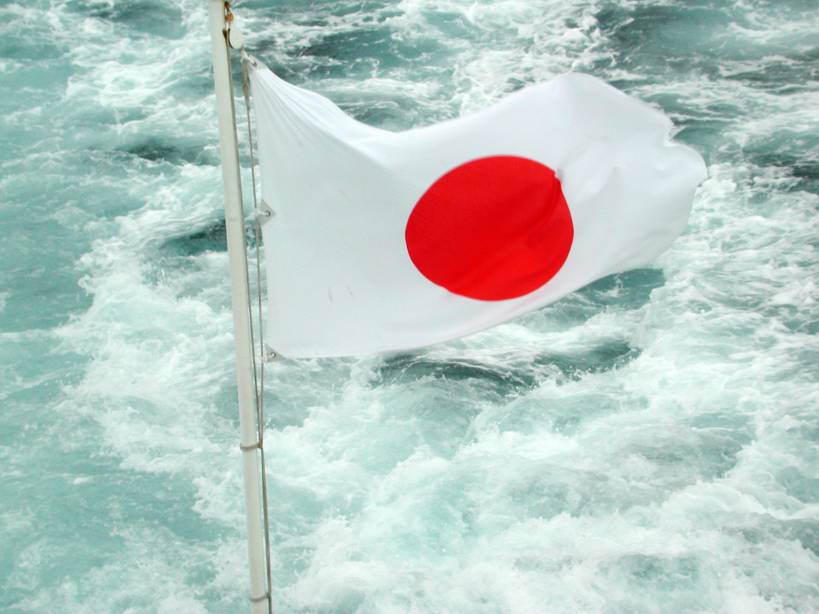 The aftermath of last Friday’s earthquake and tsunami in Japan is nothing short of horrific. I’m sure most of you have seen footage of the devastation on the news and on YouTube. My mind is boggled, my heart is aching, and I am all in all extremely overwhelmed by what is happening.
The aftermath of last Friday’s earthquake and tsunami in Japan is nothing short of horrific. I’m sure most of you have seen footage of the devastation on the news and on YouTube. My mind is boggled, my heart is aching, and I am all in all extremely overwhelmed by what is happening.
While I haven’t heard about any specific Sikh responses or relief efforts yet, United Sikhs, which sent a team to Haiti after last year’s huge earthquake, has a Japan earthquake/tsunami page up on their website. If you know of any efforts happening, please post them in the comments section.
While we keep the people of Japan in our thoughts and prayers, there are many ways we can be taking action. Below are a few simple things you can do to provide support. This is not intended to be a comprehensive list, so please add your own suggestions.
Today, March 8th, is the 100th annual International Women’s Day!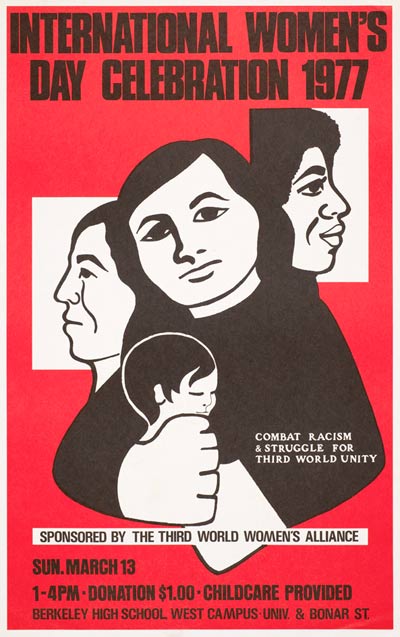 This year’s theme is “Equal access to education, training and science and technology: Pathway to decent work for women.” The first International Women’s Day was celebrated in 1911 in Austria, Denmark, Germany, and Switzerland, and is the brainchild of Clara Zetkin, a leader in the Social Democratic party in Germany, who fought for a space where women could press for their demands. This day is a celebration of the ability for women and men use our voices to advance gender equality, and the need.
This year’s theme is “Equal access to education, training and science and technology: Pathway to decent work for women.” The first International Women’s Day was celebrated in 1911 in Austria, Denmark, Germany, and Switzerland, and is the brainchild of Clara Zetkin, a leader in the Social Democratic party in Germany, who fought for a space where women could press for their demands. This day is a celebration of the ability for women and men use our voices to advance gender equality, and the need.
Gender equality has been central to Sikh social, economic, and political life since the time of the Sikh Gurus. Bebe Nanaki was the first Sikh in history to recognize Nanak as her Guru. Under Guru Amar Das Ji women were central to Sikh administrative manji system. The women of Meer Mannus prison endured extreme forms of torture and watched their children slain before their eyes but stood strong against the corrupt and brute governor of Lahore and his compatriot Kaura Mal. Fearless women warriors like Mai Bhag Kaur, Bibi Baghel Kaur, Bibi Daler Kaur stood on the frontlines of the Khalsa fauj to defend the marginalized and oppressed against authoritarian rule. Today we stand with brave Sikh women of the past and present, Mata Khivi Ji, Bibi Amrao Ji, Bibi Bhani Ji, Mata Gujri Ji, Mata Sahib Kaur, and Bibi Harnam Kaur, whose contributions to Sikhism must not fall into the shadows of Sikh religious, social, and political life as it would go against our own doctrine and values.
Please take minute on watch the clip below by three brave Sikh sisters of today willing to uphold the vision of Nanak with strength and courage. Let’s use this day to reflect on what we can do to move this community to the front lines of the Sikh vision for gender equality. #IWD in solidarity.

The massive pro-democracy uprisings in North Africa and the Middle East have gained tremendous momentum since the successful ouster of Egyptian president Hosni Mubarak two weeks ago. My thoughts and prayers are with the people of Libya this week, as their calls for the end of Moammar Gaddafi’s 42-year reign have been met with brutal repression. Gaddafi’s forces (including mercenary soldiers) have killed an estimated 640 to 1,000 protesters so far in just one week. The world is watching as the people of Libya sacrifice their lives for freedom and self-determination. May Waheguru bless them in their righteous struggle against tyranny.
Check out the below report from ABC News, but note that the message at the end about US-Libya relations is highly misleading. Though the US government has a complicated history with Gaddafi, he has been a strategic ally of the US in the region for over a decade. Until Obama’s statement on Libya just yesterday (after almost a week of brutal repression), the US has turned a blind eye to any human rights concerns in Libya. While his statement strongly condemned Gaddafi’s use of violence against the protesters, Obama stopped short of calling on Gaddafi to step down.

I will write more later. There are reasons to be excited; there are reasons to be cautious. Today I am inspired.
Guest Blogged by Amritpan

Earlier this week I received an email letter from Kashmir. This was not the first such letter from Kashmir, nor I fear, will it be the last. I’ve read this letter once, twice, again and again and still cannot begin to explain the helplessness, anger, and despair that I feel each time. Helplessness for the lives of my people lost. Anger for the status quo of violence and periods of strained silence that soon erupt into violence and for this brutal cycle. And despair for seemingly no end in sight, the lack of a process that could bring peace to my homeland.
Below I share this letter with you. Some of it was also published here.
 Last month 17 Indian nationals were sentenced to die for killing a Pakistani man. 16 of the 17 men come from a Sikh background.
Last month 17 Indian nationals were sentenced to die for killing a Pakistani man. 16 of the 17 men come from a Sikh background.
The case has attracted some attention in the Indian press, but has now found place on the BBC and other sources due to Amnesty International, a premier human rights group, calling attention to the torture of the defendants.
Amnesty says the men were taken to the scene of the killing in the emirate of Sharjah and forced to re-enact it. It says they were made to beat a police officer posing as the dead man a month after their arrest – an act filmed and presented as genuine evidence.
Citing evidence produced by Indian rights group Lawyers For Human Rights International (LFHRI), Amnesty said that the 17 men were beaten with clubs, given electric shocks, deprived of sleep and forced to stand on one leg for prolonged periods.“This is a mockery of justice. These 17 men have been tortured, forced to confess and sentenced to death based on a faked video,” Amnesty’s deputy director for the Middle East and North Africa, Hassiba Hadj Sharaoui said.“Amnesty International is calling on the UAE authorities to investigate the allegations of torture and abuse and to ensure the 17 men receive a fair trial on appeal,” the group said in a statement. [link]
Sikhs will be celebrating Vaisakhi world wide next week on April 14th. Sikhs in Malayasia are requesting that Vaisakhi be made a national holiday.
Tan Sri Darshan Singh, the President of Malaysia National Sikhs Movement president, said, “The Sikhs who arrived earlier in this country served in the security forces and have contributed towards the economic development of Malaysia”. Karpal Singh of DAP believes that Vaisakhi should be given consideration as a national holiday because of its considerable significance to Sikhs. However, Malaysian Sikhs have not gotten a positive response from the government.
A common saying is a community knows when its contributions are being viewed as an important part of a “host” country’s fabric of life when the entire nation gets a day off on a day that is significant to that community. In a nutshell, it means you have really “made it”.
I look forward to the day that non-Sikhs will be taking Vaisakhi off in Malaysia and America. We have “made it” in these countries in many ways although we are often treated like “resident aliens”. I wish it wouldn’t take a national holiday to break that mold, but may be it would help?
Wow. The use of graphics to display information about war costs is very powerful. Look at a few graphics below published on The Guardian’s blog about the cost and size of armed forces world-wide.
War Chests: Who has the biggest military budget per year?
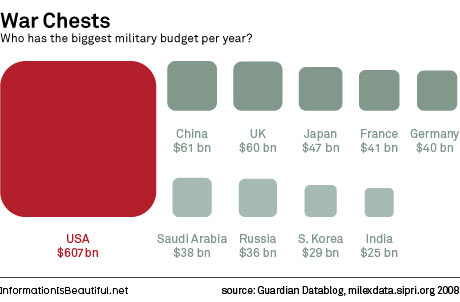
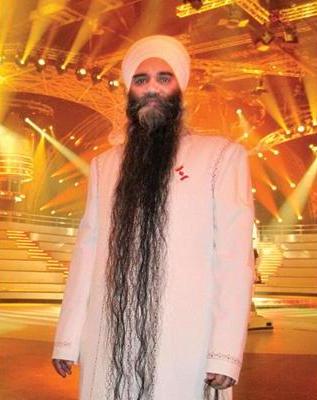 Bhai Sarvan Singh, the head granthi at Guru Nanak Sikh Temple in Vancouver has broken his own Guinness World Record of having the longest beard. His beard is now under 8 feet!
Bhai Sarvan Singh, the head granthi at Guru Nanak Sikh Temple in Vancouver has broken his own Guinness World Record of having the longest beard. His beard is now under 8 feet!
Initially Bhai Sahib was hesitant to take part in the competition because he did not grow his long beard for publicity. He grew it as part of his Sikh faith. However, he soon realized that the publicity actually helped encourage other Sikhs to keep this article of faith.
His translator Avtar Singh Gill said to the Vancouver Sun:
“So many other Sikhs have called him, saying, ‘You’re keeping that long hair and we are cutting our beards; we should not cut them,'” Gill said. “Some of them have promised that. Now he’s more comfortable than at the start.”
I also imagine this publicity is helping educate non-Sikhs about the Sikh faith.

